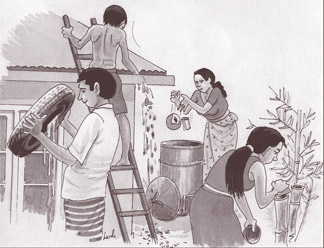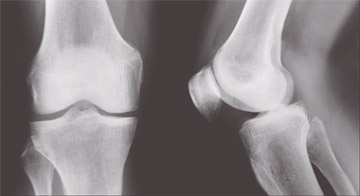|
Health Watch
Protect yourself from dengue
Nadira Gunatilleke
The National Mosquito Control Week ended yesterday. The teams which
inspected possible dengue mosquito breeding sites located countrywide
have found some interesting facts.
The general public is well aware of common and popular mosquito
breeding sites such as yoghurt cups and tires but they are not aware of
uncommon and unpopular mosquito breeding sites such as pieces of roofing
sheets, plastic/polythene covers and the trees that belong to bromeliad
family.
|

Say no to Dengue fever |
The public must pay special attention to some uncommon and unpopular
mosquito breeding sites located in homes and other properties. They are
trees such as banana and pineapple, Rampe leaves, alocasia (habarala),
coconut shells which are used in rubber estates, kurumba, plats that
belong to bromeliad family, fallen palm fronds, bamboo trees that are
cut, parts of banana trees and tree holes.
Western Province is the most affected province. Colombo, Gampaha and
Kandy districts are the most affected districts in the Western Province.

The dengue mosquito does not come from the garbage dump located one
kilometre away from your home or the abandoned lake located one and half
kilometres away from your home.
It does not come from the water tank which is located over 750 metres
away from your home. It will come from a place located just within a
radius of 500 metres. Therefore look carefully for the possible mosquito
breeding places (where water is getting collected) located within a
radius of 500 metres from your home. May be it is located inside the
garden of your neighbour who is also your best friend! Around 35 per
cent of the dengue patients are women and 25 percent of them are school
children which means they had been infected when they are either at home
or school. In some houses table legs are being kept on small water pots
in order to prevent ants. These water pots are another good breeding
ground for mosquitoes.
Dengue larvae can survive in a dry environment for a period of one
year. Even after one year these larvae can produce dengue mosquitoes
when they receive water. This shows the danger of keeping your
surrounding unclean.
Due to rainy weather, it is impossible to stop rain water getting
collected in your compound.You too may have plants that belong to
bromeliad family in your garden. So you have to destroy them or spray an
insecticide to the place where water gets collected.
You have to inform the PHI if your best friend who is also your
neighbour is growing bromeliads.
How about your office air conditioners and flower pots/vases? Are
there any mosquitoes inside your fully air conditioned and cleaned
office ? Does your employer maintain these machines properly? If not
don't keep your mouth shut and take dengue fever with you when you go
home after work.
He cannot sack you for requesting a safe and healthy working
environment! You have the right to have a safe and healthy working
environment. If there are mosquitoes inside your fully air conditioned
modern office!
Go and check your child's school environment. Your child has a right
to study in a safe and healthy school environment. School authorities
should make sure that your child study in an environment that is free
from dengue mosquitoes.
Blaming your child's school when he or she get affected with dengue
is wrong if your child spends his or her evenings in tuition classes! It
is your responsibility to go and check all the tuition classes your
child attends and make sure that no dengue mosquito breeding sites are
around.
It is the responsibility of everyone at home to clean your home and
garden and make sure that there are no places where water can get
collected. Do not wait for someone else to take care of your life.
Do it yourself. Clean your home and environment. Do not turn a blind
eye to the mosquito breeding site located inside your neighbour's garden
and in your work place. Act now itself and be safe.
We always talk about symptoms, treatment, mosquitoes, cleaning
mosquito breeding sites, etc. But there are many other important facts
that we never talk about. Now the time has come to talk about what you
can do as an ordinary responsible citizen of Sri Lanka to protect
yourself from dengue.
Take a very good care of your child who is suffering from fever. It
can be dengue. Let him/her rest. Do not giver painkillers to your child.
Give him liquids moderately. Don't stop paying attention even when fever
is gone.
It can return as dengue shock syndrome or dengue hemorrhagic fever (DHF).
Be vigilant on existing symptoms even after fever is gone. May be the
child is not in the hands of a perfect health staff.
Your attention and enthusiasm is very much needed during such
occasions. When a person, especially a child gets fever, medical
treatment should be sought immediately without unnecessary delays and
applying home remedies.
It is better to seek medical treatment from a state hospital. This is
because such institutions have a proper follow up programme for
suspected dengue patients.
Seeking medical treatment early from a state hospital is vital. DHF
patients must admitted to main state hospitals.
Feelings are stronger than mind
Dr. Marcel de Roos
Many people have an almost ingrained denial of mental health issues.
It’s fine to hobble around with your broken leg in plaster and share
this inconvenience with everybody who cares to listen.
|

Scanning of a human brain by X-rays |
On the other hand it’s almost a taboo to talk with a friend about
your depressed child or about the relationship problems you have with
your spouse. In addition, many of us have a tendency to medicalize
psychological issues (taking pills instead of talking about feelings).
Possible reasons could be feelings of shame or fear of gossip. When
clients finally come to my psychology practice to talk about their
issues, very often they say that they chose me because I am a foreign
resident (Dutch, and married to my Sri Lankan wife Jennifer). They
assume (which is true) that I don’t gossip about my clients.
Whether we like it or not, in life outward appearances count: the
husband has to earn well, the wife smiling and pleasant and the children
must be well behaved and show good study results. To complete this fairy
tale package, the house and car must be owned and regular holidays
abroad should be included too.
Many families suffocate in this outward shell. In any marriage there
are issues which need to be talked about: relationship problems (like a
lack of affection/respect, conflicting personalities, sexual problems,
unfaithfulness, communication problems, etc.), unhappy children
(problems at school, anxiety, depression) and financial problems to name
a few.
Mind and behaviour
To top this, in South East Asian culture, much attention is placed
upon mind and behaviour; emotions are usually disregarded. In reality,
emotions (and instincts) are the driving forces in our lives.
Evolutionary speaking, emotions are much older than our cognitive brain.
We are often taken by surprise by instinctive reactions and emotional
impulses. Although our thinking process is very quick and seems to be
the powerful ruler, emotions are difficult to control from the neo
cortex. It’s one of the reasons why we sometimes feel “driven” without
exactly knowing why. We can be filled with joy, overwhelmed by grief,
engulfed with power or we can feel deeply depressed.
 There
seems to be a lot of misunderstanding about emotions and how to try to
change unwanted behaviour and emotions. As a result, while attempting to
change emotions people use “here and now” techniques which offers only
short term recourse. Perspective (“the glass is half full instead of
half empty”), positive thinking, concentrating on your strengths and
positive points, and so forth. The problem with these techniques is that
they are mind driven and focus on your behaviour whilst totally ignoring
the uniqueness of the emotions. What is worse, they only concentrate on
the present and disregard the influence of emotions from your past. There
seems to be a lot of misunderstanding about emotions and how to try to
change unwanted behaviour and emotions. As a result, while attempting to
change emotions people use “here and now” techniques which offers only
short term recourse. Perspective (“the glass is half full instead of
half empty”), positive thinking, concentrating on your strengths and
positive points, and so forth. The problem with these techniques is that
they are mind driven and focus on your behaviour whilst totally ignoring
the uniqueness of the emotions. What is worse, they only concentrate on
the present and disregard the influence of emotions from your past.
Chemical imbalance
Another misconception is the “chemical imbalance” theory concerning
emotions. This is just a marketing concept from the pharmaceutical
industry and an incomplete one at that. At present, emotions cannot be
corrected with
fine-tuned medications to bring on the desired specific effect in the
brain. The state of the art medication for depression is a good example
for this. For light and moderate depression a placebo pill(!) and of
course psychotherapy does a better job than anti-depressants. Only with
a severe depression anti-depressants for some reason seem to have an
influence on patients, but they should always be combined with
psychotherapy. Psychotherapy deals with causes and not only with
symptoms as these pills allegedly do. The underlying theory for the
supposedly working of anti-depressant pills is incomplete and lacks
direct evidence. And lastly, the modern anti-depressants have a long
list of possible (serious) side effects.
What does work is a combination of cognition, behaviour, emotions,
influences from your past and the present. This blend will bring you
balance in your life.
Twenty five years ago when I started practising, the emphasis in
psychology was on trying to change the thoughts of clients. The
assumption was that as a result of this their feelings would improve. As
I got more experienced I realized that it wasn't helping my clients in
the long term. The feelings of depression or anxiety in many cases
reappeared after a while. That's why my motto in psychology is ‘feelings
are stronger than the mind’. The inclusion of feelings and making them
the focal point of the therapy changed a lot for my clients.
Painful feelings
When people are feeling empty, depressed or burnt out, these are in
many cases symptoms of an underlying conflict. Usually these symptoms
stem from feelings from the past which are still too painful to be felt.
Secondly, it focuses our attention to our self instead of towards those
who have done us harm in the past. When you succeed in making the
connection, then those 'old' feelings (usually mixed with present ones)
explain to you the cause of your present state. Then you can start to
feel the painful feelings from the past in full. At first you practise
it with the help of a therapist and later by yourself. After a while the
intensity of the painful feeling will diminish.
Focusing on your feelings can reveal the real cause of your issues
and can allow you to feel the deeper, underlying roots. The new approach
is that you don't focus on the 'thought' side, but that you work with
your feelings. Present plus past combined. It is a very down to earth
method. It is aimed at giving the client powerful tools to do the work
himself so that in time he does not have to rely on the therapist.
Apparently psychotherapy seems to consist only of talking. But in
reality it is all about FEELINGS. Regularly (once or twice a week)
venting your feelings and speaking about your issues with a professional
psychologist in a safe setting can significantly alleviate your burden.
Study suggests how often to test bone density
Gene Emery
A new study tracking loss of bone
density over time gives doctors a better idea of how often to conduct
bone density screenings, a test that previously had few guidelines for
use
Older women with thin bones should be screened every year and those
with denser bones can safely wait up to 17 years to have their next bone
mineral density test, according to new research.
Current recommendations have relied on bone mineral density readings
to try to predict the speed at which bones weaken with time, said lead
author Dr. Margaret Gourlay of the University of North Carolina at
Chapel Hill School of Medicine. "This is the first U.S. study to do it
based on patients."
Based on results from 4,957 women who were studied for 15 years, the
report, "makes a major contribution toward filling a significant
knowledge gap in the field of osteoporosis," said Dr. Margery Gass,
executive director of the North American Menopause Society, whose
guidelines for brittle bone disease suggest testing postmenopausal women
every two to five years.
About 10 million Americans over 50, most of them women, have
osteoporosis, according to the National Institutes of Health. The cost
to the U.S. health care system is as much as $18 billion per year.
|

A bone x-ray |
Gourlay's team found that the best time to have a subsequent bone
density test depended on a woman's starting point, as gauged by the
so-called T score derived from using X-rays to measure the density of
bones in the hip. The lower the score, the weaker the bones.
Among women age 67 or older who started out with a normal T score of
-1.00 or higher, it took an average of 16.8 years for 10 percent of the
group to develop osteoporosis, indicated by a score of -2.50.
They also looked at women with osteopenia, in which "your bones are
thinner but not at the osteoporosis level yet," Gourlay told Reuters
Health. As those T scores fell, it took less time for osteoporosis to
develop in 10 percent of the women.
For women with the lowest starting scores of -2.00 to -2.49, the
interval was just 1.1 years. For women with a score of -1.50 to -1.99,
it was 4.7 years. And among women who scored -1.01 to -1.49, it took
17.3 years for one in 10 to progress to osteoporosis.
The researchers adjusted the analysis to account for estrogen use and
risk factors for osteoporosis. The volunteers were women from Maryland,
Minnesota, Pennsylvania and Oregon.
"We knew that the groups that had thinner bones to start with were
going to transition to osteoporosis faster," said Gourlay. However, "we
were not expecting this kind of separation between the low risk and high
risk group. For those women with a T score above -1.5 to have just a 10
percent chance of making the transition to osteoporosis after 17 years
was a great surprise. This was very good news."
However, the time intervals were not the same for all women age 67
and older. They shrank as women aged.
"For example, among women with moderate osteopenia, the estimated
(bone density) testing interval was approximately 5 years for women who
were 70 years old and approximately 3 years for those who were 85 years
old," the researchers wrote in the New England Journal of Medicine.
Gourlay cautioned that the time scales may also be very different for
women under 67.
"The findings in this paper will enable clinicians to recommend bone
mineral density testing from an evidence-based position," Gass said in
an e-mail, adding that testing has been both under-used and over-used,
depending on the setting, "primarily because of lack of data to inform
guidelines."
It's under-used in women over 65 and over-used "in early
postmenopausal women, the majority of whom are at very low risk of
fracture," she said. "Some clinicians are even getting a 'baseline' in
early postmenopausal women, something no medical society is
recommending."
Her group recommends screening for all women who are age 65 and older
and for women ages 50 to 64 if they are smokers, consume alcohol daily,
weigh less than 127 pounds, have rheumatoid arthritis, have already had
a fracture suggesting that their bones might be weak or had a parent who
suffered a hip fracture.
The test itself typically costs $250.
Gourlay said it's not clear if the guidelines will save money. "This
tells us how to use the test better, but we're still concerned that
overall the test is not ordered enough."
She cited a 2008 study of female Medicare beneficiaries over age 64
in which only 13 percent had ever gotten an initial bone density test.
"This is 13 percent of the women who, everyone agrees, should have the
first test." Reuters Health |



